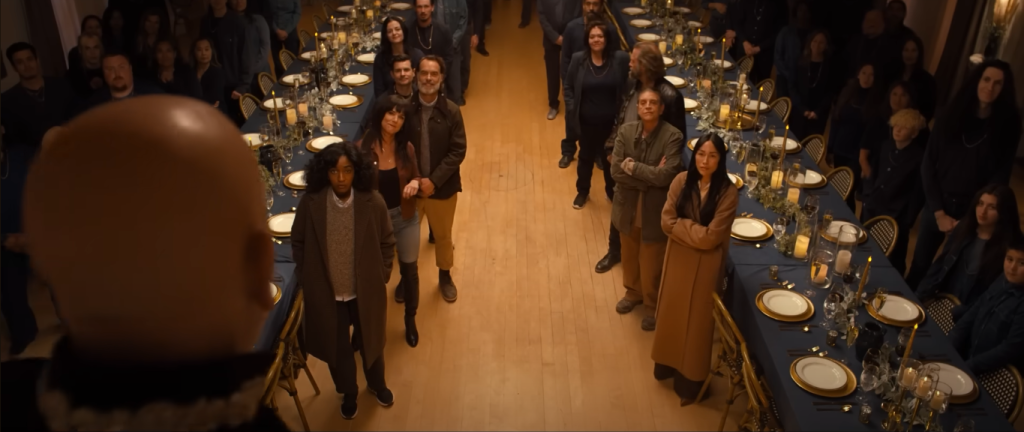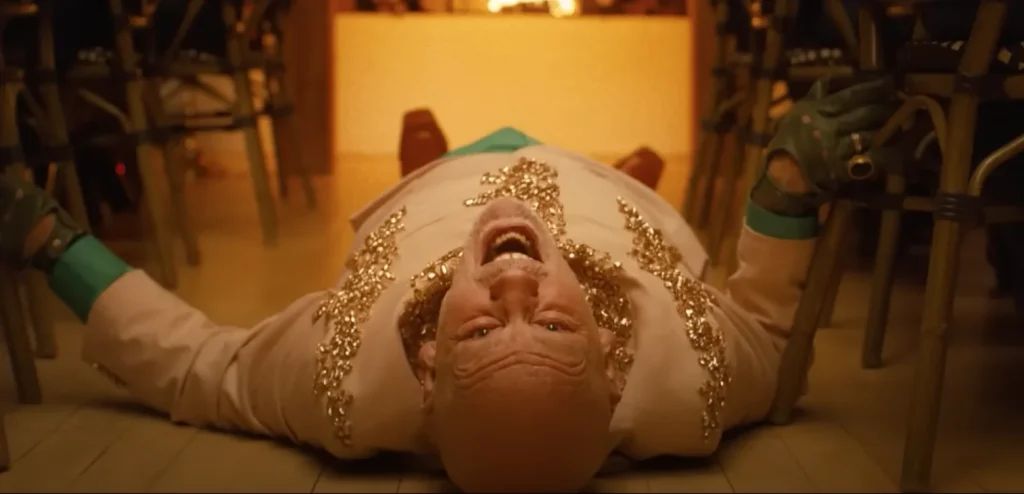
What happens when the lines between genius and madness blur? When does admiration curdle into obsession? Opus, the latest psychological horror-thriller from A24, dives into a world of mystery, music, and manipulation—where the price of witnessing greatness might just be your soul.
Ariel Ecton (Ayo Edebiri), a sharp-witted music journalist hungry for the next big story, receives an invitation to an exclusive listening event hosted by none other than Alfred Moretti (John Malkovich), a legendary pop icon who vanished from the public eye decades ago. His long-awaited album promises to be a masterpiece, a culmination of years in seclusion. But as Ariel steps into Moretti’s sprawling desert compound, she quickly realizes that this is no ordinary event.
At its core, Opus attempts to dissect the fine line between admiration and indoctrination, asking, when does fandom evolve into blind worship? The premise is gripping, and the opening sequence delivered a captivating introduction—but while the setup brims with potential for psychological terror, the execution wobbles under the weight of a screenplay that never quite figures out what it wants to say. The themes of fame, artistry, and devotion feel undercooked, as if the film is afraid to push them into truly unsettling territory.
For the first two-thirds, Opus holds its audience with an unsettling, slow-burning tension. The cinematography is deliberate, with eerie bird’s-eye shots and claustrophobic frames that heighten the sense of unease. The production design is immaculate, creating an environment that feels both alluring and suffocating, perfectly mirroring the psychological manipulation at play. But then comes the third act—a spectacular collapse of momentum and coherence.

What should have been a crescendo of horror feels incomplete and rushed. Elements that seem significant—such as the oysters and the dolls resembling guests—are left dangling with no real payoff. The film hints at deeper meaning but refuses to commit, leaving audiences with questions, not intrigue.
Director Mark Anthony Green aims to tap into the increasingly popular cult-horror trend, but rather than innovating, the film recycles familiar beats without offering anything fresh. In his directorial debut, he shows flashes of vision, but the film often feels like it wants to be something greater than it actually is. Opus has all the ingredients of a psychological horror masterpiece, but the final product is a dish that wasn’t fully cooked, more like a lesser-known cousin to Midsommar and The Menu trying too hard to impress at the family dinner.
If there’s one reason to sit through Opus, it’s Ayo Edebiri. She carries the film with effortless charisma, navigating Ariel’s descent from intrigued journalist to desperate survivor with precision. Every scene she’s in is heightened by her presence, making the weaker elements of the film at least somewhat tolerable.
John Malkovich, however, is another story. Given his recent streak of questionable roles, his casting as Moretti wasn’t exactly a vote of confidence. While his performance isn’t outright terrible, it leans too heavily on his usual eccentricities, making Moretti feel more like a caricature than a truly unsettling figure.

When you see A24 attached to a film, there’s an expectation of something unique—a level of cinematic ambition that dares to challenge convention. And while Opus wears the A24 aesthetic, it lacks the substance that defines their best work. Instead, it feels like one of their more commercially driven releases, relying on style over narrative depth.
Opus isn’t an outright disaster, but it exists in that strange purgatory between “bad” and “just okay.” It fails as a horror movie, its mystery isn’t all that mysterious, and its ending leaves more frustration than fascination.
Would I recommend seeing it in theaters? Absolutely not. Save your money. This is the kind of film that might work as a late-night background watch, but not something you should invest in expecting a profound or chilling experience.
Rating: ★★★★★☆☆☆☆☆ (5/10)
